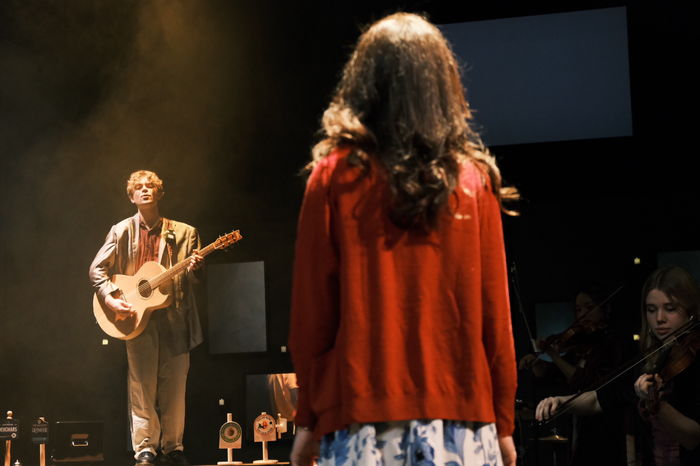Ill-Divining Souls struggles to hit the mark
Josh Pritchard finds Ill-Divining Souls to have a lot of potential, but it fails to make much of an impact

There is a moment in Ill-Divining Souls when Freddie (a flirtatious and seemingly immature actor) tells his co-star Orla: “Stop making everything about Shakespeare.” The pair are the stars of a doomed production of Romeo and Juliet; the director is a maniac, the co-director inexperienced, and the rest of the cast absent. Orla is Freddy’s opposite: dedicated, hard-working, and a passionate admirer of the Bard. Perhaps it’s just the influence of my degree, but I expected to sympathise with Orla in this production, and for a time I did – but in this moment, Freddie was right. Ill-Divining Souls is infatuated with Shakespeare, but it struggles to apply the same level of care to its own cast, resulting in a production that feels rough around the edges, with some glimpses of brilliance.
I do applaud writer Annie Fogden for not settling for the expected. Orla and Freddie do not engage in an over-the-top romantic affair, as we might anticipate. Instead they remain consistent rivals, butting heads over the role of Shakespeare, love, and their own privilege within the acting industry. Their conversations, performed by the charming Kaitlin Pryce and Jude King, are engaging, if occasionally repetitive. I was about half an hour in before I realised there hadn’t been a scene without Orla being upset about something Freddie had done, despite his frequent attempts to be earnest.
“It’s an ambitious script, one which is let down”
Fogden’s creativity shines in other ways, such as double-casting King as Orla’s ex to highlight the parallels she perceives between them, and drawing on real-life cases of artists grappling with their sexuality and mental health to satirise the exploitation of powerful industry moguls. It’s an ambitious script, one which is let down by (mostly) unambitious staging, set, and lighting plan, the latter of which feels particularly disappointing considering the venue of the Corpus Playroom.
The dialogue is, unfortunately, inconsistent, and scenes which should hold much more emotional gravitas are rendered less impactful under the weight of unnecessary detail and unnatural phrasing. Though never terrible, the script feels as if it could’ve done with another draft, or another pair of eyes. This extends to the direction. One confusing moment depicts Laurie complaining when Orla picks up the phone “finally” despite the fact he’s had to wait about three seconds – if this was a joke, it didn’t register as one. Moments of meta-theatre (where Orla and Freddie portray R&J on stage) are equally underwhelming. A dour, unimaginative blue light obscures the actors’ facial expressions, and the use of voiceovers in the re-enaction of the iconic suicide scene completely extirpates any sense of dramatic tension or spectacle.
“There are moments where the play breaks free of the sum of its parts”
At times, the play directly borrows lines from Romeo and Juliet, though the impact of these references varies tremendously. While some – especially early on – are delivered effectively, they ultimately feel superfluous, serving more out of a sense of obligation than necessity. Although I initially liked the use of R&J’s opening prologue, its appearance feels ill-fitting in hindsight. It seems to imply that Orla and Freddie have the potential to develop into romantic partners, yet upon watching the play, I found it very difficult to imagine a scenario in which the pair would ever sustain a relationship.
There was one instance where these inclusions did work. Greg Worden’s sarcastic delivery of “These violent delights have violent ends,” provoked quite a hearty laugh from my audience, yet the energy in the room quickly deteriorated when he began to enact a full Shakespearean soliloquy, detracting from what could have been a standout moment of cynical humour.
Much of what’s wrong with Ill-Divining Souls can ultimately be put down to a lack of refinement. Nothing here is fundamentally poor: the premise is good, the cast engaging, and there are moments where the play breaks free of the sum of its parts. A play focused on the prior activities of Laurie (the play’s director), Freddie, or Orla would, I’m sure, be highly entertaining. But for now, it might be time to give this production a bit of rethinking. Parting may be such sweet sorrow, but not in comparison to viewing a play with greater potential.
‘Ill-Divining Souls’ showed at the Corpus Playroom from Wednesday 19 February until Saturday 22 February at 9:30pm.
 Music / The pipes are calling: the life of a Cambridge Organ Scholar25 April 2025
Music / The pipes are calling: the life of a Cambridge Organ Scholar25 April 2025 Arts / Plays and playing truant: Stephen Fry’s Cambridge25 April 2025
Arts / Plays and playing truant: Stephen Fry’s Cambridge25 April 2025 Comment / Cambridge builds up the housing crisis25 April 2025
Comment / Cambridge builds up the housing crisis25 April 2025 Interviews / Dr Ally Louks on going viral for all the wrong reasons25 April 2025
Interviews / Dr Ally Louks on going viral for all the wrong reasons25 April 2025 News / Candidates clash over Chancellorship25 April 2025
News / Candidates clash over Chancellorship25 April 2025






